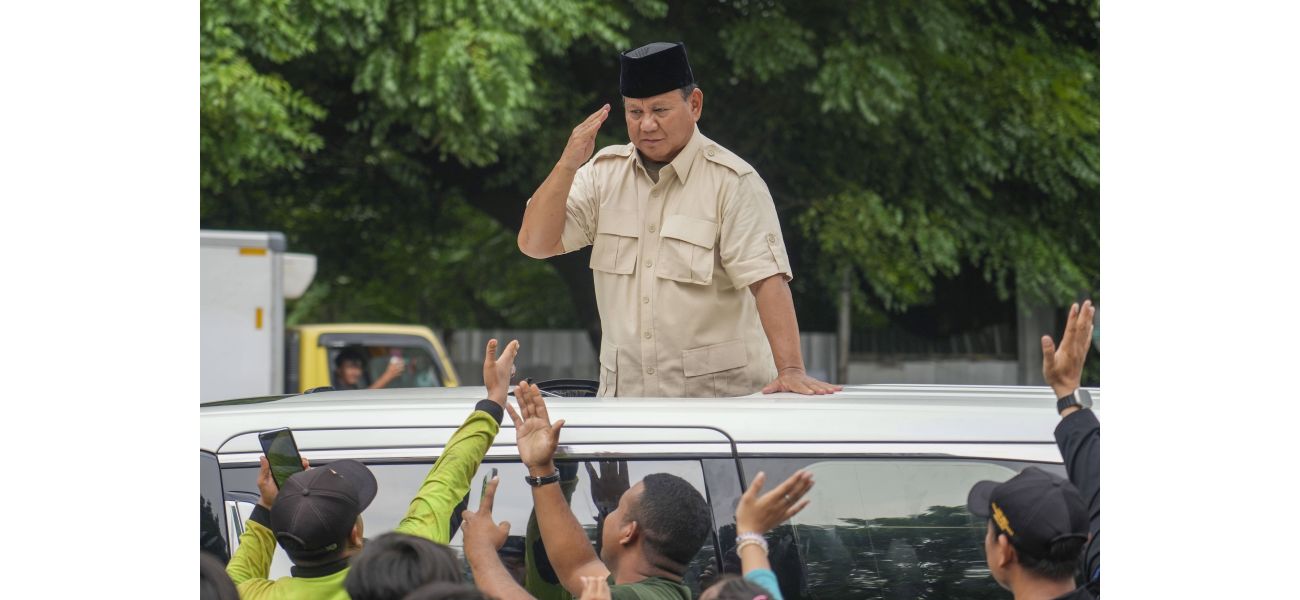Indonesia's new president is a former general taking the oath of office.
A former military leader, connected to Indonesia's previous dictator and current president, will become the country's new leader on Sunday.
October 20th 2024.

A new leader is set to be inaugurated in Indonesia on Sunday, and he is already causing quite a stir. Prabowo Subianto, a wealthy ex-general with connections to both the outgoing president and the country's past dictatorship, has promised to continue the popular policies of his predecessor. However, his human rights record has raised concerns among activists and analysts about the future of Indonesia's democracy.
Subianto, aged 73, presented himself as the successor to the immensely popular President Joko Widodo, who was the first president to come from outside the political and military elite. As the former defence minister, Subianto pledged to continue the modernization agenda that has propelled Indonesia into the ranks of middle-income countries with rapid growth.
In a recent speech, Subianto, who is also the chair of the Gerindra Party, emphasized the importance of remaining loyal to the nation rather than to himself. He also vowed to defend the people at any cost, even risking his own life. He stated, "Once you sense that I am straying from the right path, please leave me. My life, my oath...I am willing to die for the truth, for the people, for the poor, and for the honor of Indonesia. I have no doubt."
Despite his promises of continuity and dedication, Subianto's past remains a cause for concern. As a former lieutenant general under the brutal Suharto dictatorship, he is linked to torture, disappearances, and other human rights abuses. Some human rights groups have accused him of involvement in these violations during Indonesia's occupation of East Timor in the 1980s and 1990s. However, Subianto has denied these allegations.
Aside from his plans for continuity, Subianto has yet to reveal many concrete plans, leaving many observers uncertain about what his election will mean for the country's economy and its still-maturing democracy. As a former rival of Widodo, Subianto lost two presidential races to him before embracing him as his successor, even going so far as to choose Widodo's son as his running mate. This decision has raised concerns about the emergence of a political dynasty in Indonesia's young democracy.
Despite these concerns, Subianto's widespread support was evident in the election on February 14. He secured a majority with 59% of the votes, or over 96 million votes, in a three-way race. This was more than enough to secure victory without the need for a run-off.
However, questions remain about Subianto's ties to the $US30 billion project to build a new capital city called Nusantara. Reports have claimed that his family stands to profit from the project due to their land and mining interests in East Kalimantan, where the new city will be located. While a family member has denied these allegations, Subianto's family also has business connections in various industries, including palm oil, coal, gas, mining, agriculture, and fisheries. These ties have raised concerns about potential conflicts of interest once Subianto takes office.
As Indonesia prepares for a new leader, the nation is faced with uncertainties and concerns. Only time will tell how Subianto's leadership will impact the country's democracy and its economy.
Subianto, aged 73, presented himself as the successor to the immensely popular President Joko Widodo, who was the first president to come from outside the political and military elite. As the former defence minister, Subianto pledged to continue the modernization agenda that has propelled Indonesia into the ranks of middle-income countries with rapid growth.
In a recent speech, Subianto, who is also the chair of the Gerindra Party, emphasized the importance of remaining loyal to the nation rather than to himself. He also vowed to defend the people at any cost, even risking his own life. He stated, "Once you sense that I am straying from the right path, please leave me. My life, my oath...I am willing to die for the truth, for the people, for the poor, and for the honor of Indonesia. I have no doubt."
Despite his promises of continuity and dedication, Subianto's past remains a cause for concern. As a former lieutenant general under the brutal Suharto dictatorship, he is linked to torture, disappearances, and other human rights abuses. Some human rights groups have accused him of involvement in these violations during Indonesia's occupation of East Timor in the 1980s and 1990s. However, Subianto has denied these allegations.
Aside from his plans for continuity, Subianto has yet to reveal many concrete plans, leaving many observers uncertain about what his election will mean for the country's economy and its still-maturing democracy. As a former rival of Widodo, Subianto lost two presidential races to him before embracing him as his successor, even going so far as to choose Widodo's son as his running mate. This decision has raised concerns about the emergence of a political dynasty in Indonesia's young democracy.
Despite these concerns, Subianto's widespread support was evident in the election on February 14. He secured a majority with 59% of the votes, or over 96 million votes, in a three-way race. This was more than enough to secure victory without the need for a run-off.
However, questions remain about Subianto's ties to the $US30 billion project to build a new capital city called Nusantara. Reports have claimed that his family stands to profit from the project due to their land and mining interests in East Kalimantan, where the new city will be located. While a family member has denied these allegations, Subianto's family also has business connections in various industries, including palm oil, coal, gas, mining, agriculture, and fisheries. These ties have raised concerns about potential conflicts of interest once Subianto takes office.
As Indonesia prepares for a new leader, the nation is faced with uncertainties and concerns. Only time will tell how Subianto's leadership will impact the country's democracy and its economy.
[This article has been trending online recently and has been generated with AI. Your feed is customized.]
[Generative AI is experimental.]
0
0
Submit Comment





